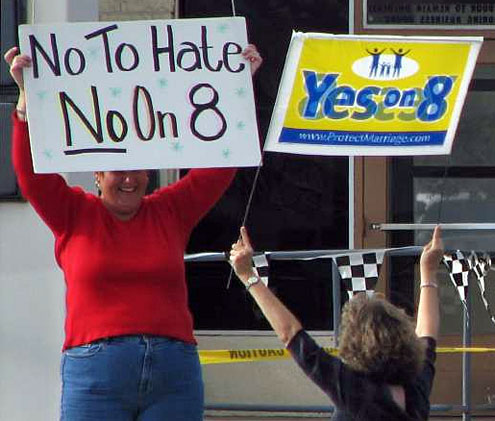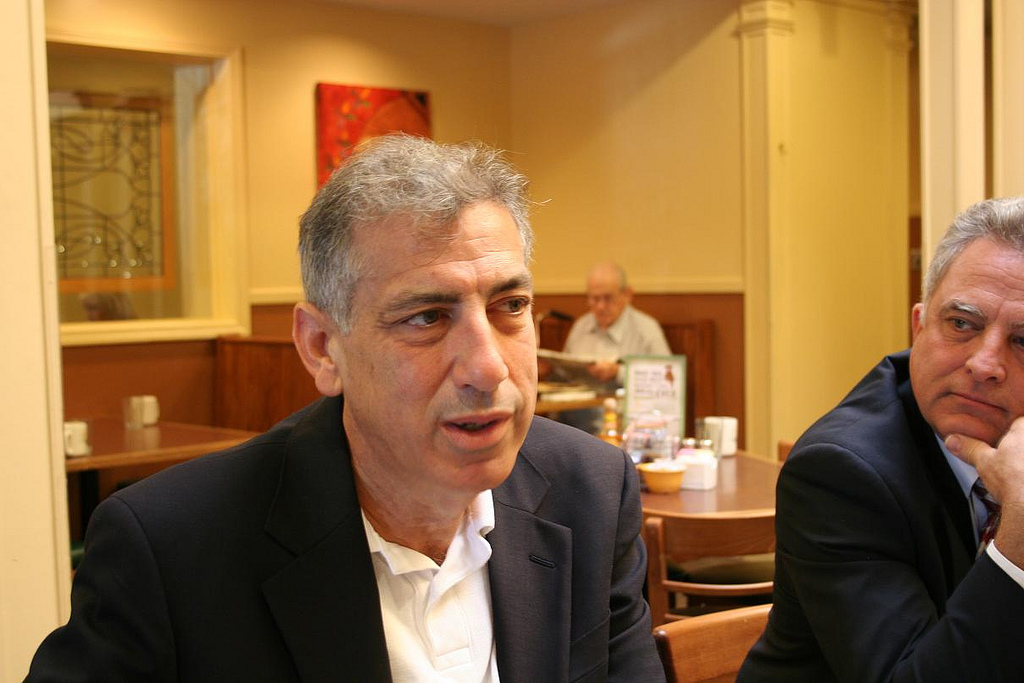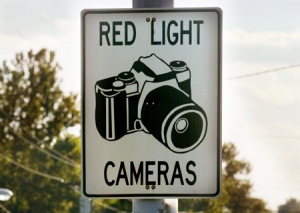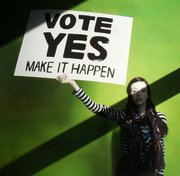Citizen Blog
Zocalo Public Square is hosting an even tomorrow (Wednesday Sept. 21) at 7 pm at Fort Mason Center in San Francisco. Participants will be discussing the question; “How Do We Put The People Back In the Initiative Process?” The event is free, but reservations are recommended. You can reserve a seat here.
 A San Francisco federal judge decided today to release video recordings of last year’s trial over the constitutionality of California’s ban on same-sex marriage.
A San Francisco federal judge decided today to release video recordings of last year’s trial over the constitutionality of California’s ban on same-sex marriage.
Two same-sex couples, along with a coalition of news organizations, asked for the release of the videos, saying there is no reason to keep them secret.
Judge James Ware did leave open the possibility that a higer court could overturn his ruling, and won’t release the videos until September 30th.
A KOB4 News report reveals that all but $50 supporting a measuer on the Albuquerque ballot came from Redflex, the camera maker who stands to profit if the measure passes. City politicians are defending the company’s actions, while civil rights supporters say the company shouldn’t be taking money from citizens. Retired police sergent Paul Heh asks:
Why do we even have these when we pay police officers to do the same job and your rights aren’t violated?
As supporters of petition rights call on Gov. Jerry Brown to veto another attack on Californians’ initiative and referendum rights, anti-voter legislators hope that three is a charm.
Citizens in Charge President Paul Jacob tells the story in his weekly column at Townhall.com:
 Pete Peterson of the Davenport Institute for Public Engagement at Pepperdine University’s School of Public Policy was spot on in his blasting of Democrat California Legislators’ systematic attempts to protect their majority control by smashing the state’s initiative, referendum and recall process.
Pete Peterson of the Davenport Institute for Public Engagement at Pepperdine University’s School of Public Policy was spot on in his blasting of Democrat California Legislators’ systematic attempts to protect their majority control by smashing the state’s initiative, referendum and recall process.
 Recently the ShowMe Progress blog caught up with long-time political strategist and former Howard Dean campaign manager Joe Trippi to talk about the Your Vote Counts Act. For BlueGirl:
Recently the ShowMe Progress blog caught up with long-time political strategist and former Howard Dean campaign manager Joe Trippi to talk about the Your Vote Counts Act. For BlueGirl:
It comes down to a simple question. Do we trust the voters to do the right thing in the light of day or does the General Assembly hold all of the marbles?
With his veto of SB 448, California Governor Jerry Brown has rejected the state Legislature’s attempt to restrict citizen petitions for the second time in just over a month. Responding to the bill’s draconian requirement that petition circulators wear a badge while talking to voters, the Governor asked:
If it is acceptable to force paid signature gatherers to place identifying badges on their chests, will similar requirements soon be placed on paid campaign workers?
Clearly, Brown saw the absurdity of the badge proposal:
Supporters of initiative rights in California and beyond maintain hope that Gov. Jerry Brown will veto backwards legislation that would force any Californian petitioning her or his government to wear a large badge on their chest, a requirement dubbed a “Yellow Star Law.”
As we’ve reported, the badges required by SB 448 would display information about whether a petition circulator is paid or not: anti-initiative legislators hope that voters will be unlikely to sign petitions when they know the person collecting them is being paid to do so. Less measures on the ballot means less choice for voters, and in turn more power for legislators and the special interests that influence them.
(Lake Ridge, VA) – Paul Jacob, president of Citizens in Charge, a national voter rights group focused on the ballot initiative and referendum process, applauded yesterday’s federal court ruling striking down Nebraska’s restriction on non-resident petition circulators in the case Citizens in Charge v. Gale.
In a decision released late yesterday, Federal Judge Joseph Bataillon struck down Nebraska’s initiative law requiring petition circulators to be residents of the state, declaring the statutory provision “unconstitutional” as a violation of the First Amendment rights of Nebraskans.
The decision was a surprise to many observers. Although in recent years residency laws have been struck down unanimously by three separate federal circuit courts (Sixth, Ninth and Tenth), there is an Eight Circuit case from a decade ago (Initiative & Referendum Institute v. Jaeger), which upheld a North Dakota residency law. When plaintiffs sought a preliminary injunction in this case, Judge Bataillon denied it and signaled that the Jaeger case would be controlling.
As state Democrat Party leaders push yet again to restrict California voters’ access to their state ballot, a new poll finds the public wary of legislative action. According to the L.A. Times:
A June poll conducted by good-government groups found that although voters support bids for more transparency in the initiative process…they strongly oppose those that would give the Legislature more power.
State Sen. Doug LaMalfa has introduced legislation to honor the upcoming 100th anniversary of the state’s initiative and referendum process, saying [emphasis mine]:
The initiative process allows people to circumvent a legislature that is often ineffective, cumbersome and has many priorities that do not reflect the will of the people. In its 100 years, direct democracy has been a game-changer in California politics.

After a judge fined camera maker American Traffic Solutions $10,000 for bringing a frivolous lawsuit aimed at a suppressing voters in Bellingham, some state elected officials are speaking out. State Rep. Christopher Hurst, a former police officer who says the camera revenue has become “crack cocaine” for cities, told the Seattle Times:
Citizens in Charge president Paul Jacob sent the following message to California Governor Jerry Brown after the California Legislature went over the deep end and passed an absurd restriction on petitioners for the second time this year:
Dear Governor Brown,
Today I write to ask you to veto Senate Bill 448. If passed the bill would require citizens petitioning for an initiative, referendum or recall, and receiving any kind of compensation whatsoever, to wear a large badge on their chest saying, “PAID SIGNATURE GATHERER.”
Next month in San Francisco, I’ll participate in a panel discussion entitled, “How Do We Put The People Back in The Initiative Process?”
entitled, “How Do We Put The People Back in The Initiative Process?”
The title is far too negative, as I’ll be pointing out that the people of California are already “in the initiative process,” relishing their power to vote on every measure, defeating even the biggest spending issues backed by special interests, passing needed reforms. Yet, there are important ways to improve the process.